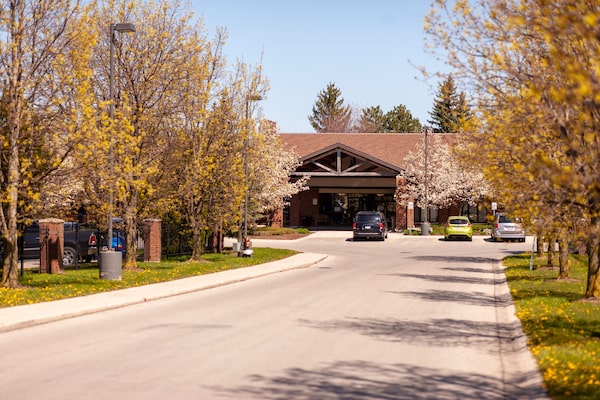
The Ministry of Labour has laid three charges against Kensington Village in London, Ont., under the Occupational Health and Safety Act.Mark Spowart/The Canadian Press
The Ontario government has taken the unprecedented step of charging a nursing home with workplace safety violations, after a COVID-19 outbreak last year left eight residents and one staff member dead.
The charges come as Long-Term Care Minister Rod Phillips pledged to strengthen the province’s oversight of nursing homes, including unannounced inspections. The government plans to unveil new accountability legislation on Thursday.
“What we will see is a different culture in terms of enforcement,” Mr. Phillips said at a news conference on Tuesday. “We want to get ahead of problems.”
The government will spend $20-million to hire almost 200 additional long-term care inspectors by next fall, as part of a plan to reinstate an oversight regime largely dismantled by Premier Doug Ford in 2018. The province currently has 156 inspectors.
The Ministry of Labour, meanwhile, quietly laid three charges on Sept. 2 against Kensington Village in London, Ont., under the Occupational Health and Safety Act. One of the charges accuses the home of “knowingly furnishing an inspector with false information,” the ministry said, declining to elaborate.
The maximum penalty for each offence, if convicted, is a fine of $1.5-million.
The charges in Provincial Offences Court are the first time the Ontario government has taken enforcement action against any home since the onset of the coronavirus pandemic in March, 2020, which has devastated the sector. COVID-19 has killed 3,824 residents and 13 employees to date.
Kensington Village “has always strived to provide, and maintain, a safe workplace for all our employees,” Tracie Klisht, executive director of the home, said in an e-mail. Sharon Village Care Homes owns the 78-bed for-profit home.
The Ontario Nurses Association revealed the charges against Kensington in a news release on Tuesday. The ONA alleged that the home did not have a sufficient stockpile of personal protective equipment, including N95 face masks.
Brian Beattie, a registered nurse at the home, died on May 12, 2020, during the outbreak.
“He was the guy who fought so hard to get PPE in there,” ONA president Vicki McKenna said in an interview. “This is a place where they were wearing garbage bags over their uniforms because they didn’t have proper gowns.”
Ms. Klisht said in her e-mail that the charges are not related to any employee’s death nor the availability of PPE for staff and residents. “Any suggestion otherwise is misleading and a disservice to our staff and families,” she said, referring additional questions to the company’s lawyer.
Jane Meadus, a lawyer at the Advocacy Centre for the Elderly in Toronto, wondered why the government has targeted Kensington when nothing has been done to address the thousands of residents who died in Ontario in other virus-stricken homes. “We’re not seeing any charges with respect to that,” she said.
Mr. Phillips said the proposed oversight legislation would allow his ministry to address complaints and critical incidents through unannounced, unscheduled inspections. And he promised new inspectors would include those with investigative backgrounds to probe more complex cases and have the ability to lay provincial offenses charges.
“These measures will help us better identify and resolve problems, increase enforcement and ensure that residents are kept safe,” Mr. Phillips said.
Shortly after the Progressive Conservatives entered office in 2018, the ministry all but eliminated wide-ranging inspections, focusing instead on responding to critical incidents and complaints.
Prior to then, the ministry conducted comprehensive inspections of most homes in 2015, 2016 and 2017. These resident quality inspections (RQI) were in addition to those triggered by complaints from residents or their families, or by critical incidents that homes must report, such as injuries. In 2019, only nine of the province’s 627 nursing homes received RQIs.
“We’re fixing long-term care ... I guess implicit in that is the fact that it was not working the way it should have,” Mr. Phillips said on Tuesday.
Asked about the charges at Kensington Village, Mr. Phillips said he cannot comment on a matter before the courts but added that he would like to see inspectors in his ministry work more collaboratively with those in the Labour Ministry.
Lisa Levin, CEO of AdvantAge Ontario, a group that represents municipal and not-for-profit long-term care homes, said tough measures are necessary to deal with bad actors in the sector, but she expressed concern that increased inspections could cause a chronically understaffed system to collapse.
“Introducing this new enforcement regime without the proper staff in place seriously risks destabilizing homes further,” she said in a statement. “It will drive well-intentioned staff, management and volunteer boards out,” she said. “If inspections and punishment come before education and staffing, there is a risk the rest of the system will crash. It is critical that homes be given time and resources to hire additional front-line health care staff and fully understand the new requirements.”
NDP Leader Andrea Horwath accused the government of protecting the “worst players” in long-term care, and said there need to be consequences for a “flagrant” lack of enforcement of regulations and rules.
Our Morning Update and Evening Update newsletters are written by Globe editors, giving you a concise summary of the day’s most important headlines. Sign up today.
 Karen Howlett
Karen Howlett Laura Stone
Laura Stone